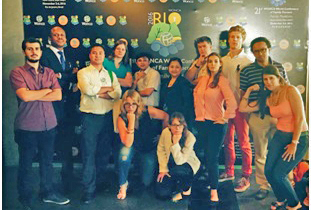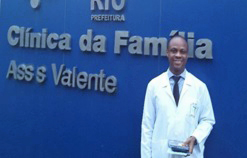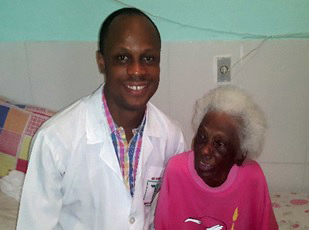WONCA Africa Montegut Scholar reports on Rio
 In 2016 the American Board of Family Medicine Foundation (ABFM-F) awarded Dr Kenneth Yakubu the 2016 Montegut Scholarship for Africa. This enabled Kenneth to attend the WONCA World conference in Rio. Kenneth writes “Through the Montegut Scholarship award for Africa, I was offered the opportunity to be part of an enriching experience, one I will remember for a very long while. Indeed, I feel blessed. Thank you, ABFM-F”. Kenneth has written an excellent report which is reproduced in full below. He is pictured above (second from left) with other young family doctors at WONCA Rio 2016
In 2016 the American Board of Family Medicine Foundation (ABFM-F) awarded Dr Kenneth Yakubu the 2016 Montegut Scholarship for Africa. This enabled Kenneth to attend the WONCA World conference in Rio. Kenneth writes “Through the Montegut Scholarship award for Africa, I was offered the opportunity to be part of an enriching experience, one I will remember for a very long while. Indeed, I feel blessed. Thank you, ABFM-F”. Kenneth has written an excellent report which is reproduced in full below. He is pictured above (second from left) with other young family doctors at WONCA Rio 2016
Read about the ABFM-F Montegut Scholarship
The 21st WONCA World Conference is over but it remains a memorable one for me, one that offered me the opportunity to interact with members of the global family medicine community. Indeed, this was an opportunity to learn, see and experience a different culture – this was my first time in Brazil and at a WONCA World Conference too.
I heard a lot about the public health system in Brazil and looked forward to seeing the transformation that had occurred with the introduction of the Family Health Strategy (FHS) into the primary health care system in Rio. As a young family physician practising in north-central Nigeria, I am conversant with family physicians offering facility/hospital-based health care services as well as playing a role in rural health care; but I was yet to see family practice as part of the overall public health strategy for a country or region. I was yet to see the family physician as one who had a role in primary health care.
Perhaps this is consistent with the experiences of many African family physicians where family practice is yet to take a leadership role in PHC.[1] Hence, my excitement with the opportunity to visit Rio, Brasil. I wanted to experience the Family Health Strategy for myself, not just read descriptions captured in reports. I then applied to be part of the pre-conference exchange organised jointly by Waynakay Brasil and Associação Brasileira de Ligas Acadêmicas de Saúde da Família (ALASF). This was a week-long observation which took place in a Primary Care Unit from the 24th - 30th October 2017. My placement was at Clínica da Família Assis Valente, Ilha do Governador (see photo below). Apart from the facility manager - Priscila da Silva Costa, I had the pleasure of meeting and working with the Family Health team led by Dr Marcia Santos, other Family physicians and trainees including – Drs Prisicila Nunes, Carla Heinzelmann, Annie Helena Wilson, Igor Soares Morais, Thamara Vieira, Luiz Sergio Zanini and Caio Maia; just to name a few. I also met other members of the FHT – community health agents, psychologists, physical educators, nutritionists, dentists, physiotherapists and pharmacists

Many fond memories come to mind as I think of my time at Assis Valente. Having spent most of my residency training and current practice at a tertiary based primary care setting, my stay at Assis Valente helped me appreciate the concept of putting the people first in the delivery of primary health care.[2] I was impressed with the location of this clinic, it was community based and served a defined geographic region. Apart from physical accessibility, members of the community could have access to care between 7 am – 7 pm.
Though this requires long work-hours for the health care providers here, they carried out their duties with such dedication and commitment I am yet to see in my own work setting. The family doctors were never in a hurry during consultations. Each consultation was done in a relaxed manner; hugs and laughter were a common phenomenon. It was so refreshing to see the camaraderie shared and continuity of care experienced. The patients knew their family health teams and each visit was an opportunity to catch up on the last visit, their health and that of their families. If I was impressed at the variety of skills the family doctors had acquired after such a short period of training, I was even more impressed that there was an intentional effort to ensure family doctors had the right set of attitudes.
From consultations for NCDs, providing health education and counselling to doing minor procedures – the role of the family physician as a provider of comprehensive health care came alive to me.
From what I saw, primary health care in Rio was focused at ensuring universal health coverage. Not only did I witness accessibility to health care in terms of time and place, financial accessibility to services at this family clinic caught my attention. Here, patients did not have to pay for basic health care services. This made me think of my patients back at home and how many of them often could not afford basic health care services. Indeed as at 2014, out-of-pocket expenditure on health in Brazil had reduced to 47.2% from 68% in 1995 while that of Nigeria had increased from 94.6% in 1995 to 95.7% in 2014.[3]
Apart from basic and comprehensive health care at the facility, I also enjoyed the home visits (See figure 4). This is one way CF Assis Valente provides Community Oriented Primary Care (COPC); but the Family doctors are not alone on this, they have the support of the Community Health Agents (Agente Saude Comunitario); who are an important link between the primary health centre and the community.
 Figure 4 Dr Yakubu at a home visit during the pre-WONCA 2016 conference exchange
Figure 4 Dr Yakubu at a home visit during the pre-WONCA 2016 conference exchange
Apart from Assis Valente, I had the opportunity of visiting Centro Municipal de Saude Manoel Jose Ferreira and Clinica Familia de Santa Marta. Each had its unique set-up. However, its approach to health care delivery was based on the same idealogy.
After a week at CF Assis Valente and a day visit to CF Santa Marta and CMS Manoel Jose Ferreira respectively, I was ready for the main WONCA conference. All through the sessions, I had this feeling of being part of a big movement, a large family, something larger than my than what I was used to.
As each speaker took turns to deliver their lectures, I embarked on a journey of reflection through the precepts of quaternary prevention, rational drug use, managing Insomnia, the growing epidemic of NCDs, the unique cultural expressions of mental health disorders and the contributions of Family Medicine to health systems all over the world including Africa.
The resource persons were wonderful but two made the most impact on me: Dr Katherine Rouleau and Prof Juan Gérvas. The later through his lecture titled “Health management taking into account the precepts of the Quaternary prevention” helped me realise my role as a family physician, to protect the wellbeing of our patients through use of appropriate technology. At another session, Prof Juan Gérvas made a strong argument for the philosophy of primary care which promotes maximum quality, minimum quantity of interventions, appropriate technology that is people oriented with guaranteed access and trickle-down effect to where it is most needed. He presented the concept of "over-diagnosis" in such a brilliant way; reinforcing the need to know what to do and when not to do anything.
At the Barbara Starfield Memorial lecture titled “Advancing global family medicine through international partnerships”, Dr Katherine Rouleau helped me appreciate the power of partnerships. I still marvel at the gift of oratory she displayed and recall how the audience came alive to the passion that drives the vision of family medicine through global health and collaboration. I have since longed for that magical experience of partnership, one in which “….individual vision is transformed into collective action and collective vision into individual momentum”.
Apart from listening to others, I had the privilege of presenting a poster and an oral abstract. The former was titled, “Doctor-centered versus Patient-centered care: effect on patient enablement among adult hypertensives at a general out-patient clinic in Africa” and the later, “Improving Patient-Doctor concordance: An intervention in the management of hypertension at a tertiary based primary care setting in Nigeria”. I also got to be a speaker at a BRITE session on the topic: “Guidelines for management and prevention of NCDS: dilemmas and solutions for the primary care physician” but WONCA 2016 was not all work. Through a rich array of social and cultural activities, the organisers spared no effort at ensuring we had memorable moments in Rio.
Last but certainly not the least, I recall with nostalgia, the opportunity to bond with other young family doctors. Indeed, this remains one of the main highlights of my conference experience. The friendship we had shared through a virtual community of Young Doctor Movements (YDMs) came alive as we saw each other – the warm hugs and kisses, the never-ending camera clicks, capturing the essence and feel of youthfulness. I daresay, I did feel invincible with these ones and even got to learn about the doctor-pose thanks to Dr Kim Yu.
I have the American Board of Family Medicine Foundation (ABFM-F) to thank for this opportunity. Through the Montegut Scholarship award for Africa, I was offered the opportunity to be part of an enriching experience, one I will remember for a very long while. Indeed, I feel blessed. Thank you, ABFM-F. It is my hope that many more young Family physicians (especially from Africa) get to benefit from this great initiative. I also hope soon; the efforts of the ABFM-F will inspire many more who will emulate their good work.
References
1. De Maeseneer J, Flinkenflögel M. Primary health care in Africa: Do family physicians fit in? In: British Journal of General Practice [Internet]. Royal College of General Practitioners; 2010 [cited 2016 Sep 26]. p. 286–92. Available from: http://www.ncbi.nlm.nih.gov/pubmed/20353673
2. WHO. Chapter 3: Primary care: Putting people first. World Heal Rep Prim Heal Care - Now More Than Ever [Internet]. 2008;381(9870):875. Available from: http://www.ncbi.nlm.nih.gov/pubmed/24616446
3. Out-of-pocket health expenditure (% of private expenditure on health) | Data [Internet]. [cited 2017 Apr 14]. Available from: http://data.worldbank.org/indicator/SH.XPD.OOPC.ZS